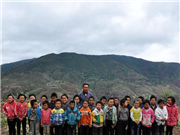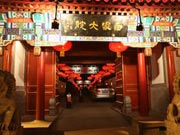

GINOWAN, Japan, May 16 -- The anti-U.S. military bases demonstration continued for the second day on Saturday as protestors from many other prefectures joining hands with Okinawa people marched around the controversial U.S. Futenma airbase in Ginowan city at the Japanese island prefecture.
The demonstration was divided into two courses so as to encircle the Futenma airbase in the downtown of Ginowan from north and south and the two groups finally assembled at a seaside park near the airbase.
The rally saw about 2,600 protestors from Hokkaido to Nagasaki with their age span from about six to the 70s, shouting that " oppose enhanced Japan-U.S. defense ties", "bring back an Okinawa without U.S. bases", "the United Stateshas to respect Okinawa people's will".
Japanese Prime Minister Shinzo Abeand U.S. President Barack Obamaagreed during Abe's recent week-long visit to the United States to enhance bilateral defense alliance and reaffirmed that to move the Futenma base within Okinawa is the only way to resolve the issue.
The Japanese and U.S. governments agreed to relocate the U.S. airbase from Ginowan city to less-populated coastal area of Henoko in Nago city in Okinawa and drilling works for the new base, the replacement for the Futenma, has been carried out, despite strong local opposition that calls for moving the base out of Okinawa.
Another demonstration was held in Henoko area on Friday which marked the 43rd anniversary of Okinawa's reversion from the United States to Japan. According to organizers, the U.S. base opponents will also hold a large scale gathering on Sunday with an estimated 30,000 protestors would participate in.
Okinawan people's resentment against the U.S. bases are deeply rooted, not only because that Okinawa hosts over 70 percent U.S. bases in Japan, but also for crimes committed by U.S. servicemen and deadly accidents related to U.S. aircrafts.
Three U.S. servicemen in 1995 brutally raped an elementary schoolgirl in Okinawa and a Marine CH-53D Sea Stallion heavy assault transport helicopter plowed into the Okinawa International University in Ginowan in 2004. Now, a total of 24 pro-accident CV- 22 Osprey aircrafts are stationed in the Futenma airbase.
A protester, a resident of the Ginowan city, identified himself as Hayasaka brought his 6-year-old son to the rally and he told Xinhua that he worries about the future of his child due to the military base so that he took his son in the peaceful march to help him establish a correct perception over military base and war.
Another demonstrator from Osaka said that the U.S. bases damage local economic development and the new base is a consequence of Abe's militarism policy which will victimize Okinawa again.
The protestors also oppose Abe's "war legislature" and called the prime minister's "proactive pacifist" as "proactive militarism ", and called for protection of Japan's war-renouncing Constitution.
The Japanese government on Friday submitted a series of security-related bills to current Diet session in a move to pave the legal way for the Self-Defense Forces (SDF) to exercise the right to collective self-defense, in line with the newly revised Japan-U.S. defense guidelines which aim at giving the SDF a greater role worldwide.
The Japanese cabinet under Abe gave green light to the SDF to exercise the right to collective self-defense which allows the SDF to engage fights overseas, but the pacifist Constitution bans the SDF to use force abroad.
Protestors said that if the bills were enacted, Okinawa will be the first victim and will be constructed as a garrison in frontline. They called for the immediate shutdown and land return of the Futenma airbase and called on the Japanese government stop its autocratic policy over Okinawa.
 |
Day|Week

 Tsinghua junior makes over 10,000 yuan a day by selling alumnae's used quilts
Tsinghua junior makes over 10,000 yuan a day by selling alumnae's used quilts Graduation photos of students from Zhongnan University
Graduation photos of students from Zhongnan University A school with only one teacher in deep mountains
A school with only one teacher in deep mountains Glimpse of cultural heritage "Xilankapu"
Glimpse of cultural heritage "Xilankapu" Homemade cured hams in SW China
Homemade cured hams in SW China Breathtaking buildings of W. Sichuan Plateau
Breathtaking buildings of W. Sichuan Plateau Graduation photos of "legal beauties"
Graduation photos of "legal beauties" Top 10 most expensive restaurants in Beijing in 2015
Top 10 most expensive restaurants in Beijing in 2015